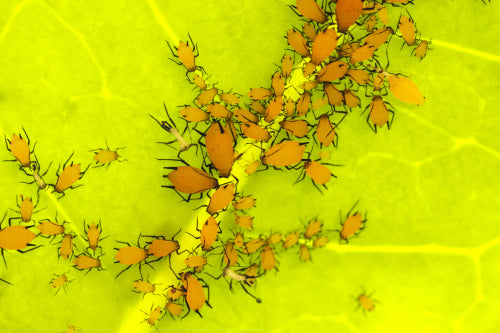Quick Listen:
Maintaining a healthy garden while preserving the environment can feel like a balancing act, especially when it comes to combating pests and diseases. While chemical pesticides and fungicides may offer quick solutions, they can be harmful to your plants, the surrounding ecosystem, and even your health. Fortunately, there are many natural, non-toxic methods available to protect your plants and ensure a thriving, sustainable garden. By incorporating organic practices, such as companion planting, beneficial insects, homemade remedies, and proper garden maintenance, you can combat common plant pests and diseases naturally. This approach not only helps your plants grow strong but also contributes to a healthier environment.
1. Understanding Plant Pests and Diseases
Before diving into the methods of control, it's essential to understand the types of pests and diseases that commonly affect plants. Garden pests can include insects, rodents, and even larger animals, all of which may feed on or damage plant tissues. Diseases, on the other hand, are typically caused by fungi, bacteria, or viruses that affect plant's ability to grow and thrive.
Common pests include:
- Aphids: Small, soft-bodied insects that suck sap from plants, often leaving behind sticky residue that attracts mold.
- Caterpillars: Larvae of butterflies and moths that can defoliate plants quickly.
- Whiteflies: Tiny insects that feed on the underside of leaves, weakening plants and spreading disease.
- Spider Mites: Minuscule arachnids that cause yellowing and stippling on leaves.
Common plant diseases include:
- Powdery Mildew: A fungal disease that appears as white, powdery spots on leaves and stems.
- Blight: Caused by bacteria or fungi, blight leads to wilting and browning of leaves and stems.
- Rust: A fungal disease that causes yellow, orange, or red spots on plant leaves.
- Root Rot: Often caused by overwatering, root rot affects plant roots and can lead to plant death.
Understanding these pests and diseases is the first step in creating an effective, eco-friendly garden defense system.
2. Natural Methods for Pest Control
Companion Planting
One of the most effective and natural ways to prevent pests in the garden is through companion planting. Certain plants have natural abilities to repel pests or even attract beneficial insects. By strategically planting these companions, you can create a natural pest barrier.
- Basil and Tomatoes: Basil is known to repel aphids, mosquitoes, and flies, making it an excellent companion for tomatoes.
- Marigolds: These vibrant flowers are not just ornamental; they repel nematodes and aphids while attracting beneficial insects like ladybugs.
- Nasturtiums: These plants act as a trap crop, drawing aphids away from more valuable crops like cucumbers and squash.
- Garlic and Onions: Both have strong scents that can help deter aphids, Japanese beetles, and other pests.
By pairing the right plants together, you create a natural pest management system that minimizes the need for chemical intervention.
Beneficial Insects
Encouraging beneficial insects to take up residence in your garden is an excellent way to naturally control pests. These insects prey on common garden pests, keeping their populations in check without the need for harmful chemicals.
- Ladybugs: These tiny, colorful beetles are voracious predators of aphids, mites, and other soft-bodied pests.
- Lacewings: The larvae of lacewings are known to feed on aphids, caterpillars, and whiteflies.
- Predatory Beetles: These beetles target pests such as slugs, aphids, and root weevils.
- Parasitic Wasps: These tiny wasps lay their eggs on pest insects like aphids, caterpillars, and mealybugs. The larvae consume the pest, killing it in the process.
You can attract beneficial insects by planting flowers like daisies, lavender, and yarrow, which provide nectar and habitat for these natural predators.
Homemade Remedies
In addition to companion planting and beneficial insects, there are many homemade remedies that can be used to fight pests and diseases in the garden. These remedies are often made from common household ingredients and are simple to prepare.
- Garlic Spray: Garlic is a natural insect repellent. To make a garlic spray, blend a few cloves of garlic with water and strain it. This solution can be sprayed directly on plants to ward off aphids, mosquitoes, and caterpillars.
- Neem Oil: Derived from the neem tree, neem oil is a powerful, natural pesticide that works against a wide variety of pests, including aphids, whiteflies, and spider mites. It also has antifungal properties, making it effective against diseases like powdery mildew.
- Diatomaceous Earth: This powder, made from fossilized algae, is non-toxic to humans and pets but deadly to insects with exoskeletons. It works by damaging the pest's outer shell, causing dehydration and death. It's particularly effective against ants, aphids, and beetles.
- Baking Soda and Water: This mixture can help combat fungal infections like powdery mildew. It works by altering the pH of the leaf surface, making it less conducive to fungal growth.
These natural remedies are safe for both your plants and the environment, making them an ideal choice for organic gardeners.
3. Proper Garden Maintenance
In addition to these active control measures, proper garden maintenance plays a crucial role in preventing pest infestations and plant diseases. Keeping your garden clean and healthy can help minimize the likelihood of problems arising in the first place.
Crop Rotation
If you grow vegetables or annuals, practicing crop rotation is an excellent way to prevent soil-borne diseases and pests from becoming established. By changing the location of crops each year, you reduce the chances of pests and diseases targeting the same plants year after year.
Pruning and Deadheading
Regularly pruning dead or diseased plant material and removing fallen leaves helps to reduce the potential spread of diseases like blight and rust. It also helps improve air circulation around your plants, which is essential for preventing fungal growth. Be sure to disinfect your pruning tools regularly to avoid spreading diseases.
Watering Practices
Overwatering or inconsistent watering can stress plants, making them more susceptible to disease. Watering deeply and infrequently encourages deep root growth and helps the plant develop a stronger immune system. Watering early in the day also prevents the development of mold and mildew, which thrive in moist, shaded environments.
Mulching
Applying a layer of organic mulch around your plants can help retain moisture in the soil, suppress weeds, and protect roots from temperature extremes. Additionally, mulch can act as a physical barrier to certain pests, preventing them from accessing plant roots and stems.
Sustainable Garden
Combating plant pests and diseases naturally is not only possible but essential for a healthy, sustainable garden. By incorporating practices like companion planting, beneficial insects, homemade remedies, and proper maintenance, you can create a garden that thrives without the need for harmful chemicals. The beauty of these natural solutions lies in their simplicity and effectiveness, offering gardeners a way to care for plants in harmony with nature.
By making informed decisions and utilizing these eco-friendly techniques, you not only protect your plants but also contribute to a more sustainable gardening environment. As we continue to face challenges with chemical pesticides and environmental health, natural pest control methods are a crucial part of creating a healthier world for future generations. Start small, experiment with these methods, and see how your garden flourishes naturally!
You may also be interested in: Hopfenkranz - DerGartenmarkt.de DerGartenmarkt.de
Discover your gardening joy with a top selection. Your joy and green happiness begin here. Shop Now
Powered by flareAI.

